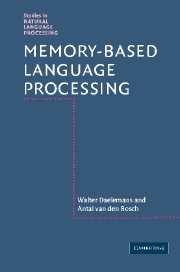Book contents
6 - Abstraction and generalization
Published online by Cambridge University Press: 22 September 2009
Summary
The concepts of abstraction and generalization are tightly coupled to Ockham's razor, a medieval scientific principle, which is still regarded in many branches of modern science as fundamentally true. Sources quote the principle as “non preterio necessitate delendam”, or freely translated in the imperative form, delete all elements in a theory that are not necessary. The goal of its application is to maximize economy and generality: it favors small theories over large ones, when they have the same expressive power. The latter can be read as ‘having the same generalization accuracy’, which, as we have exemplified in the previous chapters, can be estimated through validation tests with held-out material.
A twentieth-century incarnation of Ockham's razor is the minimal description length (MDL) principle (Rissanen, 1983), coined in the context of computational learning theory. It has been used as the leading principle in the design of decision tree induction algorithms such as C4.5 (Quinlan, 1993) and rule induction algorithms such as RIPPER (Cohen, 1995). The goal of these algorithms is to find a compact representation of the classification information in the given learning material that at the same time generalizes well to unseen material. C4.5 uses decision trees; RIPPER uses ordered lists of rules to meet that end.
In contrast, memory-based learning is not minimal – its description length is equal to the amount of memory it takes to store the learning examples. Keeping all learning examples in memory is all but economical.
- Type
- Chapter
- Information
- Memory-Based Language Processing , pp. 104 - 147Publisher: Cambridge University PressPrint publication year: 2005



